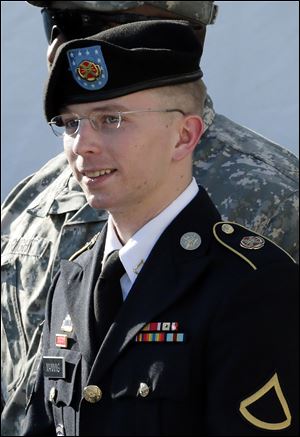
Wikileaks GI to argue his detention merits release
11/27/2012
Army Pfc. Bradley Manning is escorted out of a courthouse in Fort Meade, Md., after a pretrial hearing.
FORT MEADE, Md. — An Army private charged in the biggest security breach in U.S. history is trying to avoid trial by claiming he was already punished enough when he was locked up alone in a small cell and forced to sleep naked for several nights.
Pfc. Bradley Manning was expected to testify about his treatment during a pretrial hearing set to begin Tuesday and run through Sunday in a military court at Fort Meade, outside Baltimore.
Manning's lawyers contend he was illegally punished by being locked up alone in a small cell for nearly nine months at the Marine Corps brig in Quantico, Va., where he had to sleep naked for several nights.
Military commanders from Quantico and Fort Leavenworth, Kan., where Manning was later moved, were expected to testify first in the proceedings.
Judges can dismiss all charges if pretrial punishment is particularly egregious, but that rarely happens. The usual remedy is credit at sentencing for time served, said Lisa M. Windsor, a retired Army colonel and former Army judge advocate now in private practice in Washington.
In a 1956 case, U.S. v. Bayhand, a military appeals court ordered all charges dismissed against a soldier who had been forced during his pretrial confinement to do hard labor alongside a sentenced prisoner. The court ruled that the soldier had been given an illegal order.
Since then, there have been few, if any, cases in which pretrial punishment has led to dismissal of all charges. Lt. Col. Eric Carpenter, chairman of the criminal law department at the judge advocates school in Charlottesville, Va., said he couldn't find one but he couldn't say for sure that the remedy hasn't been granted.
Manning has also offered to take responsibility for the leak by pleading guilty to reduced charges. The military judge hasn't yet ruled on the offer and prosecutors have not said whether they would still pursue the charges against him.
He was kept at the Marine Corps brig from July 2010 to April 2011. The military contends the treatment at Quantico was proper, given Manning's classification as a maximum-security detainee who posed a risk of injury to himself or others. He was later moved to Fort Leavenworth, where he was re-evaluated and given a medium-security classification.
A United Nations investigator called the conditions of Manning's time at Quantico cruel, inhuman and degrading, but stopped short of calling it torture.
Outside Fort Meade, about two dozen people gathered in the rain and under umbrellas to show support for Manning. Some held a banner that said, “Support Bradley Manning.” They then observed the courtroom proceedings, many wearing black t-shirts with the word “Truth” in white lettering.
The 24-year-old native of Crescent, Okla., faces possible life imprisonment if convicted of aiding the enemy, the most serious of the 22 charges.
He is accused of sending hundreds of thousands of classified Iraq and Afghanistan war logs and more than 250,000 diplomatic cables to the secret-spilling website WikiLeaks while he was working as an intelligence analyst in Baghdad in 2009 and 2010.